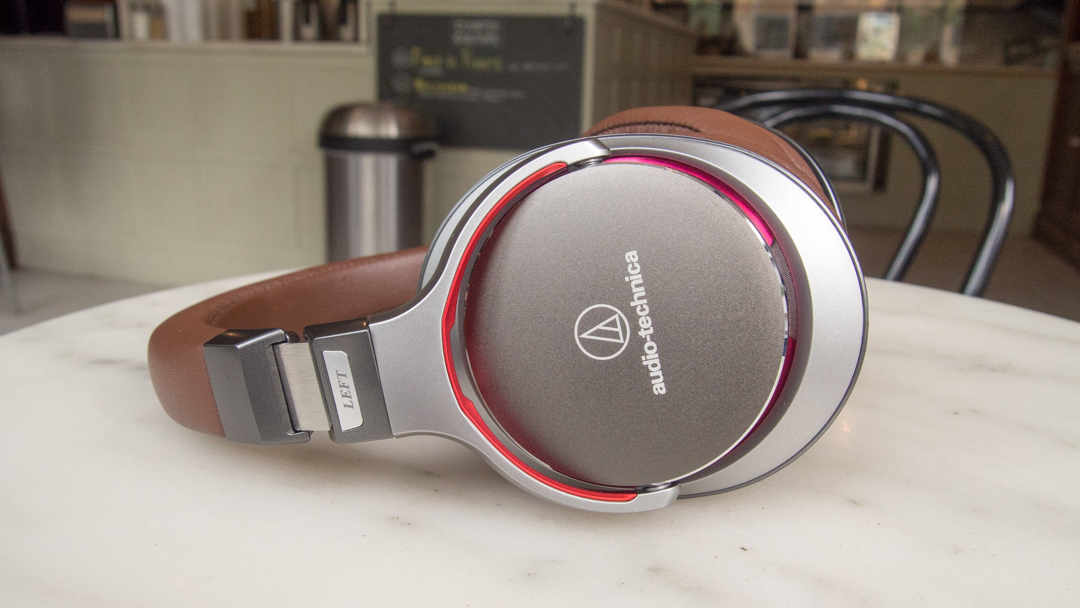TechRadar Verdict
If you're looking for a set of over-ear headphones with chops in performance and design, it could cost you a lot. But the MSR7 brings the Hi-Res ruckus for a much more affordable price.
Pros
- +
Elegant design
- +
Includes lots of goodies
- +
Incredible sound performance
Cons
- -
Tight fit
- -
No inline volume control
Why you can trust TechRadar
Wireless headphones are all the rage, and for good reason. Listening to music wire-free is simply more convenient, as you don't even need to touch your music player to change songs. That said, there will always be a loyal crowd of headphone enthusiasts that refuse to snip the cable. Why? Sound quality.
At its current state, wireless technology can't stream true audiophile-level sound without costing a fortune. Going wired is the cheapest way to get anything close to that level of audio quality, but even that can cost a fortune.
Until now. With the $250 (£199, AU$349) ATH-MSR7, Audio-Technica is providing wired listeners with a complete, relatively affordable way to take a dip in Hi-Res audio. These over-ear cans don't offer much in the way of features, but the set is such a strong performer that it's minor design flaws are easy to overlook.
Design
Audio-Technica's ATH-MSR7 – I'll just call them the MSR7 from here on out – are quite the flashy take on your everyday over-ear headphones. The earmuff style is still in full effect, but just about every detail that comprises the set is lathered in modern style.

The thick headband is coated on each side with deep tan leatherette. Its insides are stuffed with just enough padding to keep you comfortable during long listens.
The leatherette gives way to some sharp, gunmetal-colored plastic pieces that assist in the adjustment of its brushed steel sidearms. The ease in which Audio-Technica transitions between build materials is seamless. Fully extended, the sidearms can stretch nine notches to make the fit much more accommodating than its default sizing.
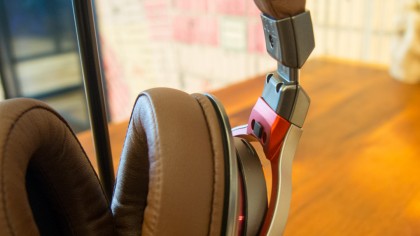
Moving down, another solid piece of plastic marks the site of the MSR7's pleasantly flexible earcup hinge. On their outside, two brushed metal pieces with "Right" and "Left" laser-etched onto them show the right way to put these on your head.
These hinges offer smooth gliding action for a generous 90 degrees of movement, which makes resting the cups on your chest during pauses in playback a breeze. However, these headphones don't fold up to be compact.
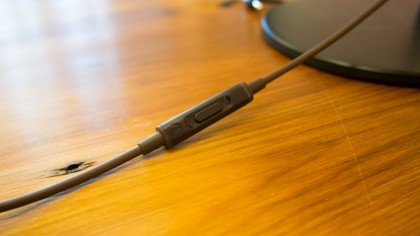
Harnessing the earcups to the hinges are two wishbone-shaped pieces of plastic, lined on their inside with metallic red detailing. The earcups themselves are pretty big, harnessing 45mm drivers inside, and consist of a mix of plastic and anodized aluminum. The Audio-Technica logo is embossed on their outsides and looks fetching. At least, as far as logo placement is concerned.
Design nerds will love the various shapes, colors and angles Audio-Technica experiments with on these earcups. It's pretty safe to say that they didn't play it safe here. Flipped over, the plush leatherette ear pads are large and well-stocked with padding.
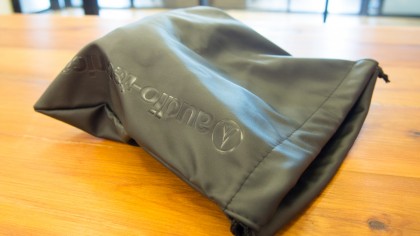
The MSR7 come stocked in a large box that's packed with goodies. First, you'll find a soft leatherette bag to tote them around in. This welcome addition will keep the MSR7 scratch-free for a long time.
Next up, a few different 3.5mm cables you can switch out. The one I used most during testing, as it aligns with my listening habits the most, is the 3.9-foot cable with inline controls. You'll also find two others in the box: a 3.9-foot cable sans inline controls and a larger 9.8-foot cable, in case you enjoy listening from a source that can't be put in your pocket.
Performance
The MSR7 certainly look the part, but where these cans really shine is with its immensely satisfying audio performance. The company put its 45mm "True Motion" drivers inside, and these Hi-Res Audio-pushing drivers excel at everything I throw at them.

I spend a lot of my time listening to music on the subway and other places that aren't too quiet, so I was a little worried that my listening experience with the MSR7 would be spoiled. Thankfully, the closed-back design of the cups, in tandem with the dense leatherette in the earpads, created a quiet environment. Once I turned music on, the sound was focused to my ears, clear of outside noise – an impressive feat for a set of headphones without active noise cancellation.
But they aren't the most comfortable. Comfort is a really subjective topic, but I'm confident that listeners who try out the MSR7 will agree: these earcups make a very tight seal around your ears. The seal creates excellent noise isolation, but two slight problems arise.
First, if it's summer, your ears are going to cook. Next, the headband will give you horrible headphone-hair. You know, that headband-shaped line pressed into your hair? It's a given then that the headband can really press hard on your cranium, but making a sidearm adjustment should fix that problem.
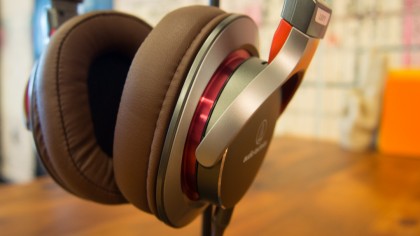
Coming back to the sound, listeners will be treated to balanced audio regardless of genre choice. Driver response is incredibly accurate here, full of attack when needed, but versatile enough to gently deliver calmer songs with equal care.
The soundstage inside these cans is expansive and enthralling. That's something I can say about several sets of headphones, but what sets the MSR7 apart here is that the sound elements don't step on one another. Each rendered sound layer compliments the others, revealing flourishes in songs that I hadn't heard before.
Final verdict
Serious listeners that still have an eye for value should know that the Audio-Technica ATH-MSR7, although not cheap, are packed with enough stellar qualities that render the cost almost a non-issue. I'll take a second to knock against Audio-Technica for the lack of inline volume controls, which is a feature that I love seeing in headphones.
Also, the amazing sound quality comes at the very minor expense of a very tight-fitting set of earcups. These gripes aside, I can't recommend the MSR7 enough for music lovers who want an upgrade that looks good, offers strong performance and won't set your wallet on fire.
Cameron is a writer at The Verge, focused on reviews, deals coverage, and news. He wrote for magazines and websites such as The Verge, TechRadar, Practical Photoshop, Polygon, Eater and Al Bawaba.
